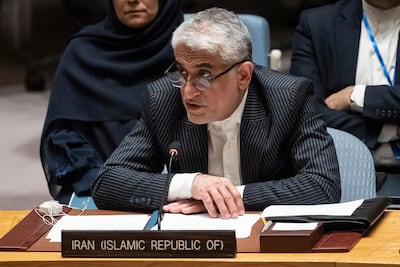Live updates: Follow the latest on Israel-Gaza
UN Secretary General Antonio Guterres on Sunday urged all parties to step back from the brink of any all-out conflict in the Middle East after Iran’s drone and missile attack on Israel at the weekend.
Iran launched more than 300 munitions at Israel, including ballistic and cruise missiles, as well as explosive drones.
Air raid alarms sounded, prompting Israelis to seek refuge in bunkers and shelters while nearly all of them were intercepted by Israel, US, Jordan and Britain.
“The people of the region are confronting a real danger of a devastating full-scale conflict,” Mr Guterres warned the UN Security Council in New York.
“Neither the region nor the world can afford more war.”
Saturday’s attack was a significant escalation of the continuing crisis in the Middle East.
Mr Guterres called for de-escalation and maximum restraint, saying it is crucial to avoid “any action that could lead to major military confrontations on multiple fronts in the Middle East”.
Iran launched the attack over a strike on its embassy compound in Syria on April 1, which killed two top Islamic Revolutionary Guard Corps commanders and followed months of clashes between Israel and Tehran's regional allies since the war in Gaza began.
It follows decades of enmity between both countries and was the first time Iran had launched a direct military assault on Israel.
Gilad Erdan, Israeli ambassador to the UN, urged the council to impose “all possible sanctions” against Iran, and other measures.
“Today the council must take action. Condemn Iran for their terror. Trigger the snapback mechanism and reimpose crippling sanctions,” he said.
Mr Erdan also called for the IRGC to be designated a terrorist organisation.
On a tablet computer, the Israeli official played a video he claimed showed Israel intercepting Iranian drones over Jerusalem's Al Aqsa Mosque compound, the third-most sacred site in Islam.
"Here, take a look," he said, presenting the tablet to Amir Saeid Iravani, the Iranian ambassador to the UN, who was sitting across the horseshoe table in the Security Council chamber.

Mr Iravani repeated Tehran's position that it is not looking for escalation or war in the region, but was exercising its "inherent right to self-defence" in its attack on Israel.
"The Security Council ... failed in its duty to maintain international peace and security" after Israel's apparent strike on an Iranian consulate in Damascus this month, Mr Iravani said.
Therefore, Tehran "had no choice" but to respond, he said.
Russia earlier proposed to the Council a press statement condemning the attack on Iran's diplomatic premises in Damascus.
The proposal was backed by China and Algeria but blocked by the US, UK and France.
The Iranian envoy also stressed that Tehran has no intention of engaging in conflict with the US in the region.
"We demonstrated our commitment to peace by exercising our restraint about involving the US Army in intercepting Iranian drones and missiles bound for military targets in the occupied Palestinian territories."
However, Mr Iravani warned that should the US initiate military operations against Iran, its citizens, or its security and interests, Tehran will use its inherent right to respond proportionately.
On Saturday night, in a post on the social media platform X, Iran's mission to the United Nations warned Washington to keep out of its conflict with Israel.
It added that "the matter can be deemed concluded".
Mr Guterres reminded member states of their obligations under the UN Charter, which prohibits the use of force against the territorial integrity or political independence of any state.
He reinforced the importance of respecting the inviolability of diplomatic premises and personnel, and made reference to his condemnation of the attack on the Iranian consulate in Damascus.
US deputy ambassador Robert Wood said Iran's “reckless actions” pose a threat not only to people in Israel, but also to those of other UN member states in the region, including Jordan and Iraq.
Mr Wood said the Security Council has an obligation not to let Iran's actions “go unanswered”.
“In the coming days, and in consultation with other member states, the United States will explore additional measures to hold Iran accountable here at the United Nations,” he said.
Mr Wood said Washington is not seeking escalation but warned that if Iran or any of its proxies launch action against the US or Israel, Tehran “will be held responsible”.

